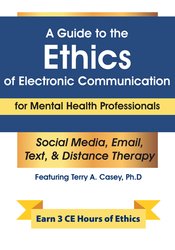

You know that to be successful as a clinician, you may need to adapt to the technology expectations of your clients.
However, the more you integrate technology into your clinical practice, the more legal and ethical risks arise.
Electronic communication, such as social media, email, text, and distance therapy are here to stay and the unique ethical complexities are growing by the day!
In this recording, Dr. Casey helps you navigate this legal and ethical minefield.
You’ll learn how to:
Whether you’re a counsellor, psychologist, social worker, or anyone in the helping professions, this program will provide an indispensable guide for how to thrive in the world of digital technology.
The future of your practice depends on it!
| File type | File name | Number of pages | |
|---|---|---|---|
| Manual - A Guide to the Ethics of Electronic Communication for Mental Health Professionals (2.2 MB) | 97 Pages | Available after Purchase | |
| Manual - A Guide to the Ethics of Electronic Communication for Mental Health Professionals - French (2.2 MB) | 97 Pages | Available after Purchase | |
| Manual - A Guide to the Ethics of Electronic Communication for Mental Health Professionals - Italian (2.2 MB) | 97 Pages | Available after Purchase | |
| Manual - A Guide to the Ethics of Electronic Communication for Mental Health Professionals - German (2.2 MB) | 97 Pages | Available after Purchase | |
| Manual - A Guide to the Ethics of Electronic Communication for Mental Health Professionals - Spanish (2.2 MB) | 97 Pages | Available after Purchase |

Terry Casey, PhD, is a licensed psychologist, HSP health service provider with over 30 years of professional experience, including a 16-year tenure as the director of counseling & psychological services for a non-profit agency with over 30 counselors at over a dozen locations. He is in private practice in Franklin, Tennessee, teaches ethics and professional issues in counseling at Lipscomb University’s graduate program in clinical mental health counseling, and guest lectures at Trevecca Nazarene University’s PhD program in Clinical counseling. Dr. Casey also served for several years as the chair of the ethics committee for the Tennessee Licensed Professional Counselors’ Association and in an advisory capacity for graduate counseling programs at two universities. He has presented frequently on ethics to organizations such as the American Counseling Association, the Tennessee Licensed Professional Counselors Association, the Nashville Area Association of Christian Counselors, and others. For more information, visit his practice website at rencounselingtn.com.
Speaker Disclosures:
Financial: Dr. Terry Casey maintains a private practice and is a faculty member of Lipscomb University. He is a published author and receives royalties. Dr. Casey receives a speaking honorarium and recording royalties from Psychotherapy Networker and PESI, Inc. He has no relevant financial relationships with ineligible organizations.
Non-financial: Dr. Terry Casey is a member of the American Psychological Association, the Tennessee Psychological Association, the Tennessee Licensed Professional Counselor Association, and others. For a complete list, please contact info@pesi.com.
Social Media – How to Avoid Ethical Nightmares
Email and Texting – Navigating the Legal Traps
Navigating Distance Therapy – 6 Ethical & Legal Keys
Please wait ...